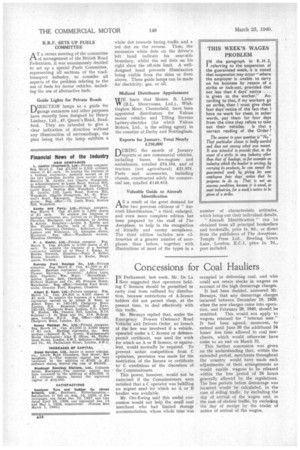Concessions for Coal Hauliers
Page 16

If you've noticed an error in this article please click here to report it so we can fix it.
IN Parliament, last week, Mr. De La 1 Bere suggested that operators holding C licences should be permitted to carry coal from railhead for distribution, because restrictions of A-licence holders did not permit them, at the present time, to deal effectively with this traffic, .
Mr. Bernays replied that, under the Emergency Powers (Defence) Road Vehicles and Drivers Order, no breach of the law was involved if a vehicle, operated under a C licence or defencepermit certificate, was used for work !Or which an A or B licence, or equivalent, would normally be required. To prevent unfair competition from C operators, provision was made for the restriction of the licence or certificate to C conditions at the discretion of the Commissioners.
This power, however, would not be exercised if the Commissioners were satisfied that a C operator was fulfilling an urgent need for which no A or B haulier was available.
Mr. Orr-Ewing said this useful concession would not help the small coal merchant who had limited storage accommodation, whose whole time was occupied in delivering coal, and who could not retain stocks in wagons on account of the high demurrage charges.
It had been decided, answered Mr. Bernays, that any demurrage charges incurred between December 18, 1939, when the new charges came into operation, and February 29, 1940, should be remitted. This would not apply to wagons retained for " internal user." It had been agreed, moreover, to extend until June 30 the additional 24 hours' free time allowed to coal merchants, which would otherwise have come to an end on March 31.
This further concession was given on the understanding that, within the extended period, merchants throughout the country would have made such adjustments of their arrangements as would enable wagons to be released within the free period of 24 hours generally allowed by the regulations. The free periods before demurrage was incurred would be calculated, in the case, of siding traffic, by excluding the day of arrival of the wagon and, in the case of station traffic, by excluding the day of receipt by the trader of notice of arrival of the wagon.




















































